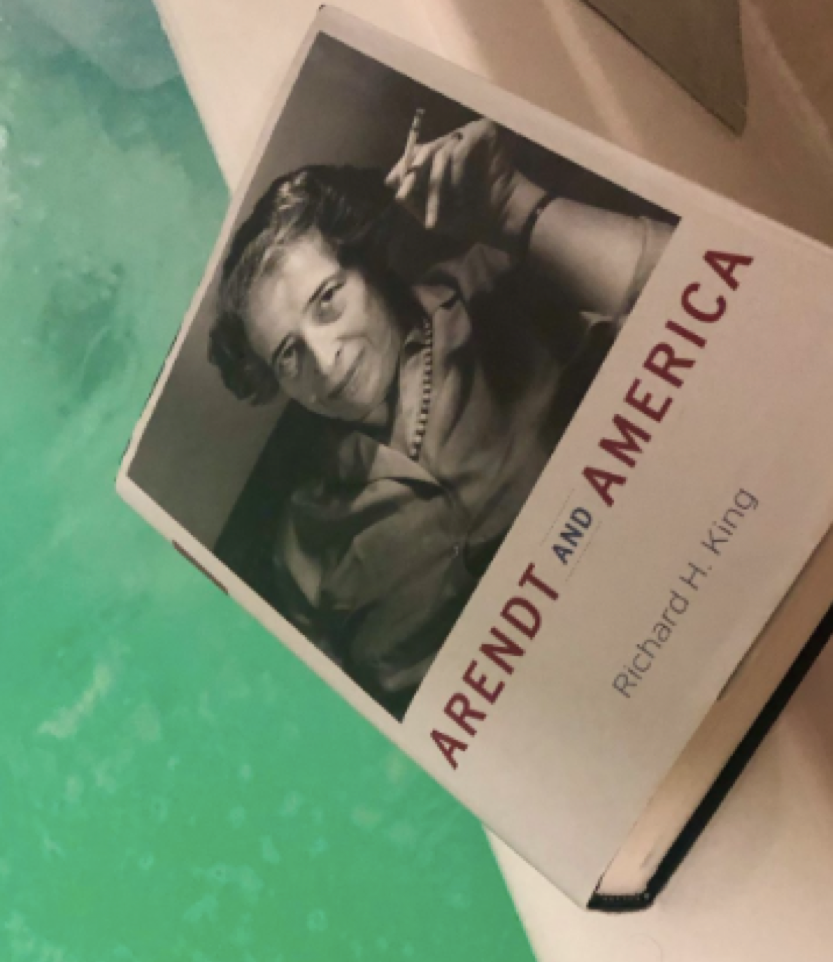Editor's Note
This is the third in a series of guest posts by Rebecca Brenner, a doctoral candidate (ABD) in early American history at American University in Washington, DC. She has served as Secretary of the Society for US Intellectual History since June 2017.
Beyond Hagiography in the 2012 Hannah Arendt Film
by Rebecca Brenner
Recently, a group of historians launched the “Women Also Know History” website, offering a searchable database of women historians of all eras and topics in an effort to prevent all-male conference panels and to make clear the reality that women do indeed also know history.[1] Among the reasons why all-men conference panels are problematic is that young women scholars deserve to see women role models. Political scientists created their own version, “Women Also Know Stuff.”[2] But even before this feminist resurgence, the 2012 “Hannah Arendt” movie provided a model of women also knowing stuff.[3] Political philosopher Hannah Arendt and her relationship with her adopted country was the topic of the monograph Arendt and America by historian Richard King in 2015. King devotes the beginning of his conclusion to analyzing the 2012 film, asking: “Is the movie Hannah Arendta kind of hagiography?” He posits: “There is no doubt that the film is made from Arendt’s point of view and that, from von Trotta on down, those involved with the film came to admire Arendt greatly.”[4] For some, this connotes hagiography. However, the Hannah Arendt film signifies much more by offering a charismatic portrayal of a strong, independent woman scholar.

Re-reading Arendt and America for pleasure (photo by Rebecca Brenner)
The film emphasizes widespread controversy over Eichmann in Jerusalem, which Arendt published in The New Yorkerfollowing Adolph Eichmann’s notorious trial.The chaos that ensues in Arendt’s daily life models a woman unconcerned with being liked. According to King, “the Arendt-Blucher apartment overlooking the East River – a triumph of authenticity according to most – was reconstructed from scratch in a Luxembourg studio.”[5] The authentic appearance enables viewers to picture Arendt’s living space, and by extension the daily life of a scholarly woman role model. Arendt and America overlooks the social importance of women and the significance of representation. Although he notes “another important aesthetic-ideological issue in the film concerns the issue of gender and feminism,” King’s analysis remains incomplete. Describing Arendt’s colleague and friend Mary McCarthy and mentioning the personal assistant Lotte Kohler, King underemphasizes the solidarity with which Arendt and McCarthy support each other intellectually and personally. In one scene, McCarthy wins an argument against a room of men professors who were denouncing Arendt’s work. Meanwhile, the significance of Kohler’s character as Arendt’s assistant is the way that she admires her boss. Arendt is prolific, Kohler is excellent, and they work well together. Any woman who has benefitted from a woman mentor understands.
The Arendt character clicks earnestly on her typewriter. She smokes lying down on her couch deep in thought. An editor at The New Yorker exclaims, “THE Hannah Arendt.”[6] Although these details are cliché, they add a much-needed portrayal of a woman intellectual to popular culture. King writes, “If the film is anything, it is tightly focused.”[7]But, the movie’s essence is much more: Hannah Arendt offers a narrative proclaiming that women also know philosophy and politics.
[1]“Women Also Know History,” Website, https://www.womenalsoknowhistory.com.
[2]“Women Also Know Stuff” Website, https://womenalsoknowstuff.com
[3]Hannah Arendt, Film by Margarethe Von Trotta (2012)
[4]Richard King, Arendt and America (The University of Chicago Press, 2015) 301.
[5]King, 298
[6]Hannah Arendt, Film by Margarethe Von Trotta (2012)
[7]King, 300

0